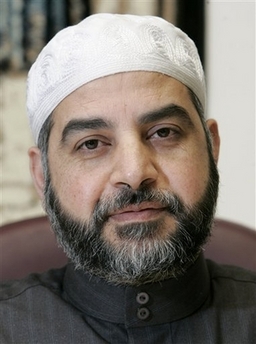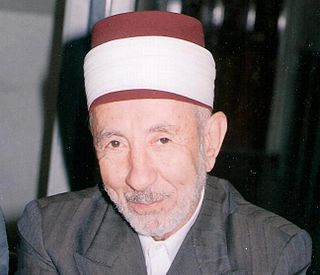Related Research Articles
The Hanafi school or Hanafism is one of the four major schools of Islamic jurisprudence within Sunni Islam. It was established by the 8th-century scholar, jurist, and theologian Abu Hanifa, a follower whose legal views were primarily preserved by his two disciples Abu Yusuf and Muhammad al-Shaybani. As the oldest and most-followed of the four major Sunni schools, it is also called the "school of the people of opinion". Many Hanafis also follow the Maturidi school of theology.

Yusuf al-Qaradawi was an Egyptian Islamic scholar based in Doha, Qatar, and chairman of the International Union of Muslim Scholars. His influences included Ibn Taymiyya, Ibn Qayyim, Sayyid Rashid Rida, Hassan al-Banna, Abul Hasan Ali Hasani Nadwi, Abul A'la Maududi and Naeem Siddiqui. He was best known for his programme الشريعة والحياة, al-Sharīʿa wa al-Ḥayāh, broadcast on Al Jazeera, which had an estimated audience of 40–60 million worldwide. He was also known for IslamOnline, a website he helped to found in 1997 and for which he served as chief religious scholar.
Hudud is an Arabic word meaning "borders, boundaries, limits". In the religion of Islam, it refers to punishments that under Islamic law (sharīʿah) are mandated and fixed by God as per Islam. These punishments were applied in pre-modern Islam, and their use in some modern states has been a source of controversy.
In Islamic Law, tazir refers to punishment for offenses at the discretion of the judge (Qadi) or ruler of the state. It is one of three major types of punishments or sanctions under Sharia Islamic law — hadd, qisas and ta'zir. The punishments for the Hadd offenses are fixed by the Qur'an or Hadith, qisas allow equal retaliation in cases of intentional bodily harm, while ta'zir refers to punishments applied to the other offenses for which no punishment is specified in the Qur'an or the Hadith or is not punishable under either qisas or hudud.
The Fiqh Council of North America is an association of Muslims who interpret Islamic law on the North American continent. The FCNA was founded in 1986 with the goal of developing legal methodologies for adopting Islamic law to life in the West.

Ali Gomaa is an Egyptian Islamic scholar, jurist, and public figure who has taken a number of controversial political stances. He specializes in Islamic Legal Theory. He follows the Shafi`i school of Islamic jurisprudence and the Ash'ari school of tenets of faith. Gomaa is a Sufi.
Muhammad Nasir al-Din, known by his nisbaal-Albani, was an Albanian Islamic scholar known for being a famous muhaddith. A major figure of the Salafi methodology of Islam, he established his reputation in Syria, where his family had moved and where he was educated as a child.
Maqasid or maqāṣid al-sharīʿa is an Islamic legal doctrine. Together with another related classical doctrine, maṣlaḥa, it has come to play an increasingly prominent role in modern times. The notion of maqasid was first clearly articulated by al-Ghazali, who argued that maslaha was God's general purpose in revealing the divine law, and that its specific aim was preservation of five essentials of human well-being: religion, life, intellect, lineage, and property. Although most classical-era jurists recognized maslaha and maqasid as important legal principles, they held different views regarding the role they should play in Islamic law. Some jurists viewed them as auxiliary rationales constrained by scriptural sources and qiyas. Others regarded them as an independent source of law, whose general principles could override specific inferences based on the letter of scripture. While the latter view was held by a minority of classical jurists, in modern times it came to be championed in different forms by prominent scholars who sought to adapt Islamic law to changing social conditions by drawing on the intellectual heritage of traditional jurisprudence. These scholars expanded the inventory of maqasid to include such aims of sharia as reform and women's rights ; justice and freedom ; and human dignity and rights.
Qisas or Qiṣāṣ is an Islamic term interpreted to mean "retaliation in kind", "eye for an eye", or retributive justice.
Diya in Islamic law, is the financial compensation paid to the victim or heirs of a victim in the cases of murder, bodily harm or property damage by mistake. It is an alternative punishment to qisas. In Arabic, the word means both blood money and ransom, and it is spelled sometimes as diyah or diyeh.
Johari Abdul-Malik Ibn Winslow Seale is a convert to Islam, and was previously the Director of Outreach for the Dar Al Hijrah Islamic Center in Northern Virginia from June 2002 until June 2017.

Dar Al-Hijrah Islamic Center is a mosque in Northern Virginia. It is located in the Seven Corners area of unincorporated Fairfax County, Virginia, in the Washington, D.C., metropolitan area.
Various sources of Islamic Laws are used by Islamic jurisprudence to elaborate the body of Islamic law. In Sunni Islam, the scriptural sources of traditional jurisprudence are the Holy Qur'an, believed by Muslims to be the direct and unaltered word of God, and the Sunnah, consisting of words and actions attributed to the Islamic prophet Muhammad in the hadith literature. In Shi'ite jurisprudence, the notion of Sunnah is extended to include traditions of the Imams.

Mohammad Ahmad Hasan Qatanani is the Imam of the Islamic Center of Passaic County in New Jersey. Mohammad Ahmad Hasan Qatanani migrated to America in 1996 as the Imam of the Islamic Center of Passaic County. Qatanani has a Ph.D. in Islamic studies from Jordanian University.
Republican Brotherhood was a small, but influential political party in Sudan. The party was founded in the 1945, by Mahmoud Mohamed Taha. The party came into the limelight in 1983, as Taha opposed the implementations of sharia laws by Jaafar Nimeiry. Taha was arrested and executed in 1985. The party continued to exist for a few years, being disbanded sometime after 1989.
Wahbah Mustafa al-Zuhayli born in Dair Atiah, Syria was a Syrian professor and Islamic scholar specializing in Islamic law and legal philosophy. He was also a preacher at Badr Mosque in Dair Atiah. He was the author of scores of books on Islamic and secular law, many of which have been translated to English. He was chairman of Islamic jurisprudence in the College of Sharia at Damascus University, and a signatory to the Amman Message and A Common Word documents.
Shaker Elsayed is an Egyptian American imam who was posted at the Dar Al-Hijrah mosque in Falls Church, Virginia from 2005 to 2017, when he resigned because of backlash stemming from his comments about female genital mutilation. He was born in Cairo, Egypt.

Ahmed Mohamed Ahmed El-Tayeb is an Egyptian Islamic scholar and the current Grand Imam of al-Azhar, Al-Azhar Al Sharif and former president of al-Azhar University. He was appointed by the Egyptian President, Hosni Mubarak, following the death of Mohamed Sayed Tantawy in 2010. He is from Kurna, Luxor Governorate in Upper Egypt, and he belongs to a Sunni Muslim family.

Khalifa Ezzat was born in Bani Sweif, south of Egypt where he first received his Islamic education in the local Al-Fahsn Institute of Al Azhar located in Al-Fashin City. It was the custom of the Saft Al-Urafa community, to enrol the able and bright students for Qur'anic memorisation. Khalifa, began memorising the Qur'an, from his teachers Sheikh Husain, then his son Sheikh Muhammad, then Sheikh Sayyed Othman.

Muhammad Said Ramadan Al-Bouti was a renowned Syrian Sunni Muslim scholar, writer and professor, where he was vice dean in theDamascus University and served as the imam of the Umayyad Mosque.
References
- ↑ P. L. Somerville, Frank. "Local Muslims celebrate end of month-long Ramadan fast". The Baltimore Sun . Retrieved September 14, 2020.
- 1 2 3 4 5 Caryle Murphy (September 12, 2004). "Facing New Realities as Islamic Americans". The Washington Post . Retrieved February 28, 2014.
- ↑ "Mohamad, A. El-Sheikh, "The applicability of Islamic penal law (qisas and diyah) in the Sudan," 1986, Ph.D. dissertation, [[Temple University]], 332 p., accessed November 7, 2009". Archived from the original on July 18, 2011. Retrieved April 6, 2020.
- ↑ Peronet Despeignes (June 20, 2004). "Koran doesn't call for beheadings, Islamic cleric says". USA Today . Retrieved November 12, 2009.
- ↑ Sheridan, Mary Beth, "Leader Named at Mosque; Falls Church Site Selects Activist," Washington Post , June 11, 2005, accessed November 7, 2009